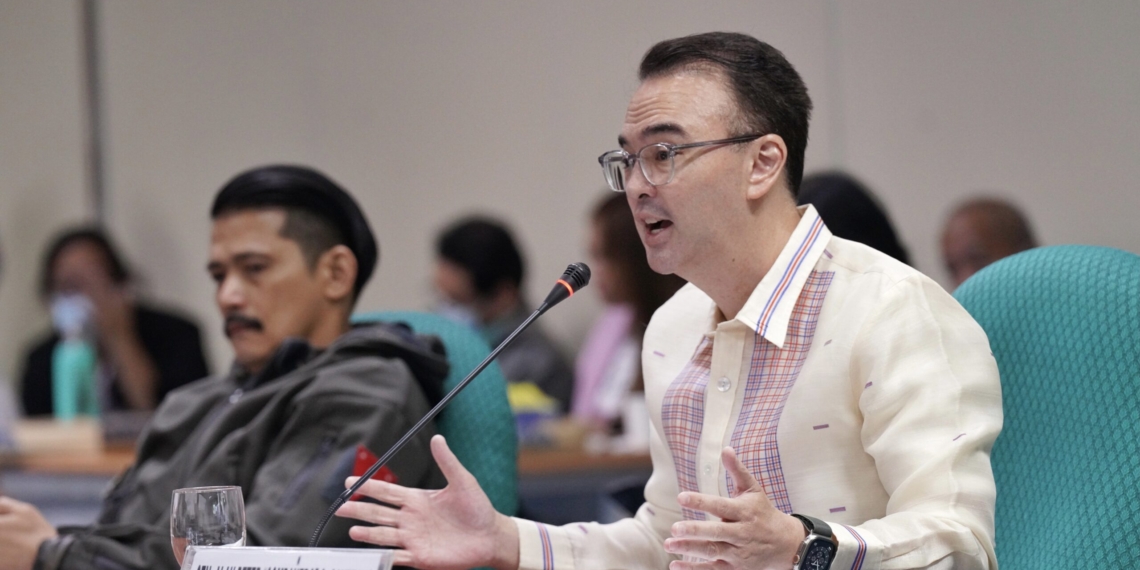For Senator Alan Peter Cayetano, who served as Foreign Affairs Secretary from 2017 to 2018 under President Rodrigo Duterte and his independent foreign policy, the country’s involvement in the West Philippine Sea (WPS) dispute is ultimately about fighting for the rights of Filipinos, not about choosing which country to side with.
Cayetano reiterated this twice in the Senate this week, first at the confirmation hearing of the ad-interim appointments of 50 General and Flag Officers of the Armed Forces of the Philippines (AFP) on Tuesday.
In a manifestation during the confirmation hearing on Tuesday, Cayetano noted how the government has always lacked a clear and consistent strategy on the matter.
“Kung gusto n’ung isang Presidente sobrang pro-China, gusto n’ung isa sobra-sobrang anti-China, gusto n’ung isa sobra-sobrang pro-US, y’ung isa anti-US,” he said. “The best of course is just being pro-Filipino,” he added.
Cayetano expressed concern over the fact that even members of the Senate and the House of Representatives are not aware of any Philippine strategy in dealing with the WPS issue in terms of our relationship with our oldest ally, the United States, and one of our closest neighbors, China.
He said the administration, together with the country’s diplomats and the leaders of the military, must start crafting a “one-hundred-year plan” or even a “one-thousand-year plan” if the country is to match China’s consistently strong and effective planning.
Not a zero-sum game
The independent Senator repeated his “pro-Filipino” stance the following day, telling the Philippine National Oil Company (PNOC) and the Department of Foreign Affairs (DFA) to prioritize the Philippines’ interests following the Supreme Court ruling on PNOC’s Joint Maritime Seismic Undertaking (JMSU) with Vietnam and China in January.
“I keep saying you can be pro-Filipino without being anti-China or anti-US. You can be pro-US but not be pro-Filipino. You can be pro-China and not be pro-Filipino. But you can be pro-Filipino and be neutral regarding every other country,” he said at the joint meeting on Wednesday of the Senate Committee on Government Corporations and Public Enterprises with the Committees on Foreign Relations, Ways and Means, and Finance.
The main focus of the meeting was PNOC Exploration Corporation’s (PNOC EC) inability to conduct seismic surveys with Vietnam and China due to the Supreme Court’s ruling that deemed the venture unconstitutional.
Back in 2005, PNOC partnered with China National Offshore Oil Corporation and Vietnam Oil Gas Corporation to explore a large portion of the West Philippine Sea. While the surveys conducted by PNOC with China and Vietnam are legal under international law, the Supreme Court said it is against Philippine law because it allowed foreign companies to explore the Philippines’ natural resources.
DFA Undersecretary for Multilateral Affairs and International Economic Relations Carlos Sorreta, however, said the SC ruling will ironically allow other countries to freely exploit the country’s resources within the Philippines’ Exclusive Economic Zone (EEZ) without the country having any say in the matter.
Cayetano emphasized the need for a careful and flexible approach to achieve a favorable outcome for the Philippines in this complex situation.
“It’s not a zero-sum game. Hindi ‘to katulad nung war na may victor at may natalo. Because in diplomacy, it’s not a zero-sum game,” he said.






